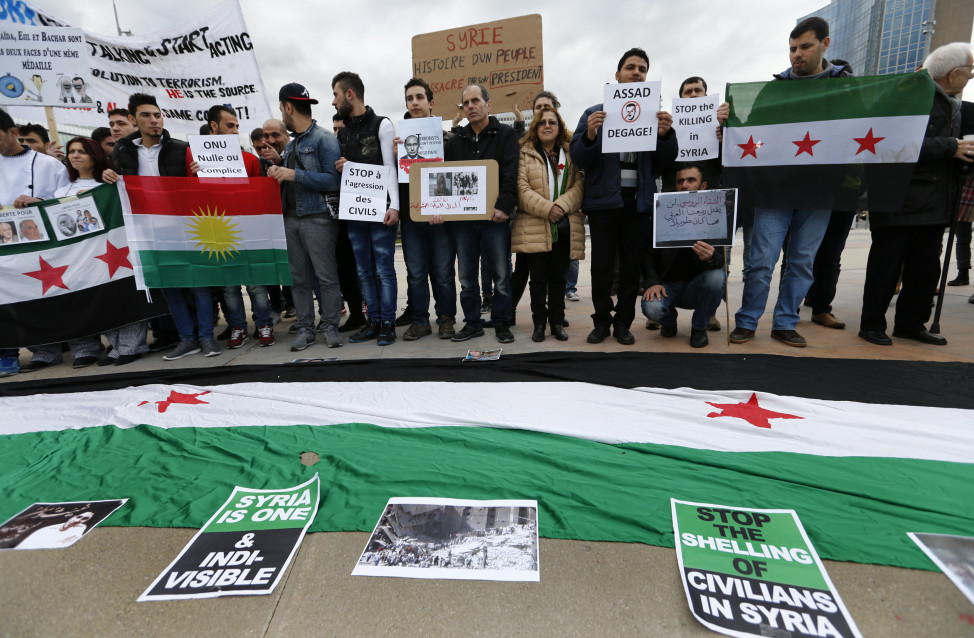By Barbara Slavin
Expectations had never been high for Syrian peace talks scheduled to open Friday in Geneva — and the refusal of the opposition to come only underscores the fragile state of the negotiations.
“They will start as planned, but I don’t have a time, I don’t have a location and I can’t tell you anything about the delegations,” United Nations spokesman Ahmad Fawzi told reporters Friday morning.
Fearing a loss of credibility at home and evidently under no pressure from their Saudi patrons to attend, opposition leaders set preconditions — among them, an end to the Syrian regime’s bombing of civilians.
They ignored admonitions from the United Nations and the U.S. State Department, to show up given the “urgency to getting these talks started,” in the words of State Department deputy spokesman Mark Toner.

People demonstrate against the Assad government ahead of the start of the Syrian Peace talks outside the U.N. European headquarters in Geneva on Jan. 29, 2016. (Reuters)
Enmity between the regime of Syrian President Bashar al-Assad and his opponents is so deep that there were no plans for face-to-face meetings even if talks begin.
Instead, the UN Special Envoy for Syria, Staffan de Mistura, offered to shuttle between delegates in what is known as “proximity” talks. The object is to agree on a new constitution for Syria within six months and a transition away from the current regime within 18 months.
That looks like mission impossible.
Invitations to the meeting only went out on Tuesday. Two days later, de Mistura issued a plea to ordinary Syrians to put pressure on the parties to show up and show flexibility at the talks. As the war enters a sixth year, “the horror is in front of everyone’s eyes,” de Mistura said. “We count on you to say ‘khalas’ [enough]… You’ve seen enough conferences. This one cannot fail.”
But regional and geopolitics do not appear to support more than episodic cease-fires in a conflict that has killed an estimated 300,000 people, reduced much of Syria to rubble and created millions of refugees. Instead, a Russian-backed campaign to recapture more territory for Assad has escalated, while U.S. airpower and special forces are concentrating on rolling back advances by the group that calls itself the Islamic State (ISIS).
Saudi Arabia has tried to organize the non-ISIS opposition into some sort of bloc, called the High Negotiations Committee. But the committee includes groups that key Assad backers Russia and Iran regard as terrorists. It also excludes others, such as the Kurds, who have done most of the fighting against ISIS.
The Russians have also sought to have Syrians participate who have not resorted to violence against what remains of the Syrian state. Vehement Assad opponents regard these people as sell-outs.
Turkey, another key player, rejects participation by the Kurds, which it alleges are part of the PKK, a group that Turkey has fought on and off for decades and considers a terrorist organization.
Most damaging of all has been the growing chasm between Saudi Arabia and Iran, a long-time ally of the Assad regime. The Saudis, the main bankrollers of the Syrian opposition, broke diplomatic relations with Iran in early January after Iranians attacked the Saudi embassy in Tehran. The outburst followed the Saudi execution of a prominent Shi’ite Muslim sheikh, who had encouraged protests by the kingdom’s Shi’ite minority.
Across the Middle East, Saudi and Iranian proxies are facing off against each other in conflicts that are feeding sectarianism and extremists. Saudi officials have spoken of wresting Syria – a country with a Sunni majority – away from Iranian influence as payback for Iraq coming under Shi’ite majority rule after the 2003 U.S. invasion that overthrew Sunni dictator Saddam Hussein. Iranians, meanwhile, have told this reporter that they are backing Shi’ite Houthi rebels in Yemen in part to punish Saudi Arabia for sending troops to squelch protests by the Shi’ite majority in Bahrain.
The only glimmer of hope comes from depressed oil prices, which are reducing resources available for foreign adventures for Saudi Arabia, Russia and Iran.
Indeed, a recent Israeli report that made the rounds on Twitter said Iran has cut funding for the Lebanese militia Hezbollah, which has been doing much of the Assad regime’s fighting, because of budget problems. Even though Iran is expecting a boost from the recent lifting of nuclear-related sanctions, growth there this year is predicted to be flat, and Iran has domestic needs that require massive infusions of new cash.
Saudi Arabia, however, still has hundreds of billions of dollars in reserves it can burn through to keep fighting in Yemen and supporting proxies in Syria. The Saudis are calculating that they can force Iran to withdraw from Arab conflicts, and that the United States will back them to counteract the prevalent view among Sunni Arabs that Washington is tilting toward Tehran because of the nuclear deal.

An emaciated Syrian boy is treated at a clinic in Madaya, Syria in an image taken from video posted by Madaya Medical Corps on Jan. 8, 2016. (AP)
What this means is more misery for Syrians. More bombardment, starvation and refugees.
According to senior U.N. officials quoted in THe New York Times, the number of areas in Syria that are besieged, primarily by Assad’s forces, has grown from 15 to 18 in recent weeks. Nearly five million people live in these difficult to reach places. According to the U.N., close to half a million have been cut off from any food or medical assistance. Images of starving Syrian babies have become all too familiar.
The famous Prussian general, Carl von Clausewitz, wrote that war is politics by other means. For centuries, that was the case in Europe, but now war is a chronic condition in the Middle East.
In his appeal to Syrians, de Mistura promised that the United Nations would “never abandon the Syrian people” but he ended his pitch with a fatalistic remark that was hardly reassuring:
“We’ll do all that we can, God willing.”
Barbara Slavin is Acting Director of the Future of Iran Initiative at the Atlantic Council in Washington.

